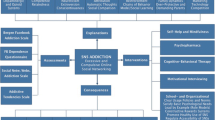Abstract
Playing Texas Hold’em Online Poker (THOP) is on the rise. However, there is relatively little research examining factors that contribute to problem gambling in poker players. The aim of this study was to extend the research findings of Hopley and Nicki (2010). The negative mood states of depression, anxiety and stress were found to be linked to problem gambling; yet, the contribution of each factor was not independently assessed. In addition, skill may be particularly important for poker players. Therefore, the effects of two potential contributing factors, yearly monetary earnings and locus of control, on problem gambling were investigated. Participants were self-selected online poker players (N = 62) who completed an online survey. Results revealed that participants played an average of 16 h per week. Furthermore, 11.5% of the sample was classified as problem gamblers according to the Canadian Problem Gambling Index. Problem gambling was uniquely predicted by time played, the negative emotion of stress, and locus of control.
Similar content being viewed by others
References
Abbott, M. W., & Volberg, R. A. (2006). The measurement of adult problem and pathological gambling. International Gambling Studies, 6(2), 175–200. doi:10.1080/14459790600928678.
Alon, N. (n.d.). Poker, chance and skill. Unpublished Manuscript, 1–17.
American Psychiatric Association. (2000). Diagnostic and statistical manual of mental disorders (Fourth Edition, Text Revision ed.). Washington, DC: American Psychiatric Association.
Bjerg, O. (2010). Problem gambling in poker: money, rationality and control in a skill based social game. International Gambling Studies, 10(3), 239–254. doi:10.1080/14459795.2010.520330.
Browne, B. R. (1989). Going on tilt: Frequent poker players and control. Journal of Gambling Behavior, 5, 3–21.
Carroll, D., & Huxley, J. A. A. (1994). Cognitive, dispositional, and physiological correlates of dependent slot machine gambling in young people. Journal of Applied Social Psychology, 24, 1070–1083.
Coman, G. J., Evans, B. J., & Burrows, G. D. (1996). Problem gambling: treatment strategies and rationale for the use of hypnosis as a treatment adjunct. Australian Journal of Clinical and Experimental Hypnosis, 24(2), 73–91.
Coman, G. J., Burrows, G. D., & Evans, B. J. (1997). Stress and anxiety as factors in the onset of problem gambling: implications for treatment. Stress Medicine, 13(4), 235–244.
Duttweiler, P. C. (1984). The internal control index: a newly developed measure of locus of control. Education and Psychological Measurement, 44, 209–221.
Faul, F., Erdfelder, E., Lang, A., & Buchner, A. (2007). G*Power 3: a flexible statistical power analysis program for the social, behavioral, and biomedical sciences. Behavior Research Methods, 39, 175–191.
Ferris, J., & Wynne, H. J. (2001). The Canadian problem gambling index: Final report. Report to the Canadian Inter-Provincial Advisory Committee. Ottawa, ON: Canadian Centre on Substance Abuse.
Goodman, S. H., & Waters, L. K. (1987). Convergent validity of five locus of control scales. Education and Psychological Measurements, 47, 743–747.
Griffiths, M., & Barnes, A. (2008). Internet gambling: an online empirical study among student gamblers. International Journal of Mental Health Addiction, 6, 194–204.
Griffiths, M., Parke, J., Wood, R. T. A., & Rigbye, J. (2010). Online poker gambling in university students: further findings from an online survey. International Journal of Mental Health and Addiction, 8, 82–89.
Hopley, A. A. B., & Nicki, R. M. (2010). Predictive factors of excessive online poker playing. Cyberpsychology, Behaviour, and Social Networking, 13(4), 379–385.
Jacobs, D. F. (1986). A general theory of addictions: a new theoretical model. Journal of Gambling Behavior, 2(1), 15–31. doi:10.1007/BF01019931.
Johansson, A., Grant, J. E., Kim, S. W., Odlaug, B. L., & Götestam, K. G. (2009). Risk factors for problematic gambling: a critical literature review. Journal of Gambling Studies, 25(1), 67–92. doi:10.1007/s10899-008-9088-6.
Lester, D. (1980). Choice of gambling activity and belief in locus of control. Psychological Reports, 47, 22–22.
Lovibond, P. F., & Lovibond, S. H. (1995). The structure of negative emotional states: comparison of the depression anxiety stress scales (DASS) with the beck depression and anxiety inventories. Behaviour Research and Therapy, 33(3), 335–343.
Meyer de Stadelhofen, F., Aufrère, L., Besson, J., & Rossier, J. (2009). Somewhere between illusion of control and powerlessness: trying to situate the problem gambler’s locus of control. International Journal of Clinical and Health Psychology, 9, 117–126.
Raylu, N., & Oei, T. P. S. (2002). Pathological gambling: a comprehensive review. Clinical Psychology Review, 22, 1009–1061.
Shead, N. W., Hodgins, D. C., & Scharf, D. (2008). Differences between poker players and non-poker-playing gamblers. International Gambling Studies, 8(2), 167–178. doi:10.1080/14459790802139991.
Wood, R. T. A., & Griffiths, M. (2008). Why swedish people play online poker and factors that can increase or decrease trust in poker web sites: a qualitative investigation. Journal of Gambling Issues, 21, 80–97.
Wood, R. T. A., Griffiths, M. D., & Eatough, V. (2004). Online data collection from video game players: methodological issues. Cyberpsychology & Behavior, 7(5), 511–518.
Wood, R. T. A., Griffiths, M. D., & Parke, J. (2007). Acquisition, development, and maintenance of online poker playing in a student sample. Cyberpsychology & Behavior, 10(3), 354–361. doi:10.1089/cpb.2006.9944.
Author information
Authors and Affiliations
Corresponding author
Rights and permissions
About this article
Cite this article
Hopley, A.A.B., Dempsey, K. & Nicki, R. Texas Hold’em Online Poker: A Further Examination. Int J Ment Health Addiction 10, 563–572 (2012). https://doi.org/10.1007/s11469-011-9353-2
Published:
Issue Date:
DOI: https://doi.org/10.1007/s11469-011-9353-2



